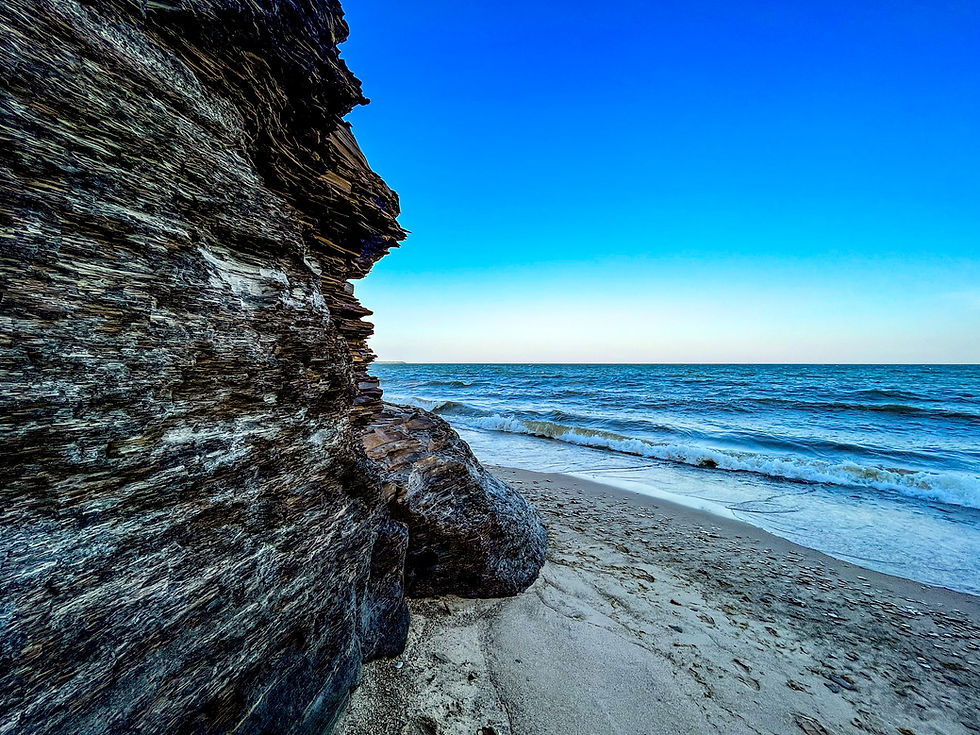On the Road Again & My Top Five Considerations for RVing
- Molly
- Dec 15, 2022
- 6 min read
After a little hiatus to spend time with family and enjoy Thanksgiving before the weather turned, we are back on the road! Last weekend, we departed Central Pennsylvania to begin our journey to Edisto Island, South Carolina. As I write this, my hometown is being subjected to a winter storm, so my timing could not have been better! PHEW!

Edisto is the first of two coastal stops on my trip before I journey west, which has provided me with a welcome sense of familiarity. During my childhood, the Carolina coastline supplied some of my most valued memories, spending weeks at a time with my grandparents at their “beach house” in Calabash, NC. The sand clinging to my legs, the salty air tossing my hair, and the scent of the ocean pulls me closer and closer to the memory of my beloved Nana. During my travels, I frequently feel her spirit with me, but it’s never stronger than when I’m on the coast. Her bold, courageous, and loving nature is an endless source of inspiration for me…. But if she were still alive, I’m sure she’d be losing her marbles over her granddaughter traveling so far alone. Sadly, she is not, so I am going to take the liberty of assuming that her spirit is as giddy as I am about the experience!
Speaking of experiences, a friend interested in the camper life recently reached out and asked if I could share a bit about the ins-and-outs of camper travel. That is the spark that created this post, and I hope it will be the spark for many more posts in the future!
Today, I’m going to share the top five practical considerations before choosing to embark on a long-term camper journey.
1. Determine your priorities and needs.
With a demanding (yet rewarding) IT job, a large breed working dog, and a love for cooking, I determined that a 27 foot “couple’s camper” was exactly what I was looking for (a post about my camper to follow in the near future). Couple’s campers have the basic requisite amenities, plus a suitably large mattress and no bunk beds. My primary draw to this style was the extra living space in lieu of bunks. My camper is about 27 feet long, has plenty of counter space, a comfy sofa, decent closet, and a queen-sized bed. We also upgraded to a 12V fridge which can operate on the battery alone, which is excellent for times without power or during travel.
Our little home-on-wheels has plenty to love, and plenty of space for me, Opey, and an occasional guest. Though I don't have extra permanent sleeping space for another human, I do carry a cot and comfy mattress pad with me, and my guests have found the combo to be plenty comfortable. Were my guests honest? Maybe! I'll have to give it a test sleep to verify.
2. Make sure that you have a travel budget in mind, even after the initial purchase of your rig.
There are a lot of factors to consider, and while you could live this lifestyle on a tighter budget than I do, I prioritize stability. There are a few factors to consider depending on your needs, wants, and means.
For my situation, I require a stable internet connection above all else. Opey isn’t going to find odd jobs moving big sticks to support us, so alas, I must remain gainfully employed. Sheesh, I’m so underappreciated in this relationship. ANYWAY, this requirement initially drove me to look for campgrounds near populated areas with good cell service to use my Verizon mobile jetpack. After a certain point, the worry of losing signal became too much, and I invested in Starlink’s RV subscription in addition to the jetpack. It’s pricey ($135/month for Starlink, $145 including Verizon) but now I can stay at state and national parks instead of expensive private parks. This flexibility saves me $20-$70 per night in fees. Fruitful investment indeed.
Though state parks are much cheaper than private parks, they also come with time restrictions, so prepare to move often. Moving can also come with increased fuel costs, so if you stay primarily in state parks, the cost/benefit of moving states, or to a private park to reset the clock should be considered.
National Parks have many of the same restrictions and benefits as state parks, but as I have found, some have added length restrictions. Over 40 feet is almost always a deal-breaker, but some can accommodate up to 30 feet, and some even less. If National Park camping is your priority, this is worth investigating.
When selecting a government-owned park site, be mindful of the utilities offered. If you don't intend to carry and fuel a generator (if generators are permitted) or install a proper solar setup, you will want to ensure that there is access to power. If you are camping in the heat, this is a major consideration, as you will want to run air conditioning. RVs are like cars, and they will get HOT inside. Most generators and solar panels will not be able to run an AC unit.
If you decide that a private park might be more your speed, research any rules and regulations that the park may have. Some private campgrounds have camper age restrictions (i.e., no campers older than ten years), and some campgrounds also have breed restrictions. This has occasionally been a challenge for me with a German Shepherd, but it has not been insurmountable. Despite all of that, there are plenty of welcoming campgrounds, but sometimes finding them may require a little homework.
I could write a book about this topic alone. There are additional factors and options that I have not discussed, such as possible utility fees at private parks, amenities such as laundry facilities, safety, and other public land options. I'll expand upon these in the future.
3. Have a firm understanding of the places you want to go, and the weather for the time of the year when you plan to be there.
RVs are not built like houses. Never intend to stay in a cold-weather-climate with an average camper. You risk damage to your investment in many ways… salt damage to the exterior, burst pipes, and mold from condensation, among other things. Should you need to temporarily push it (even with heated holding tanks), be prepared to winterize your camper, buy a dehumidifier, and pretend that you live in a mobile tin. I did this over my past month in PA, but I also had a home to escape to. If you are set on cold weather camping, look into a four seasons camper.
4. Don’t buy a tow vehicle until you have selected your camper.
Guess who has owned two trucks since she decided to embark on this adventure!? ME. I initially purchased a Ram 1500, which I thought would give me an ideal selection of smaller campers to choose from. As I went deeper into my camper purchase process, the specs reflected that it could pull a camper of my size, and my salesman agreed (to be clear, my salesman was a gem to purchase from). HOWEVER, just because it could pull the trailer, it does not mean that it should have pulled the trailer. Payload, truck weight, and tow capacity all need to be considered. Watch YouTube videos, read forums, ask questions.
I have never been more terrified in my life than I was when towing a 6,400 lbs. trailer behind my Ram 1500. The Ram's suspension simply was not designed for towing and the trailer weighed more than the truck, which frankly, I realized far too late! Eventually, at the recommendation of a very helpful mechanic, I upgraded to the most practical 2500 I could find, a Chevrolet Silverado HD. Although it has significantly fewer luxury features than the Ram, I have never been more grateful for a vehicle. She’s tall, stylish, strong, and beautiful. She’s Miss America. Hey Chevy – I think we could make this a marketing campaign, no?
5. You can do it.
Did I ever think that I could use a three-quarter ton truck as a daily driver? NOPE. Did I ever think that I could casually tow a 27-foot trailer behind said truck? Girl, you’re out of your mind.
My current reality was once just a crazy quarantine thought in the middle of the COVID pandemic. It’s taken me 730 days to get where I am now. I have the attention span of a dog in a field full of squirrels... If I can do it, so can you.
There are so many things beyond the above points that go into traveling alone in a camper. If it’s something you are passionate about exploring, don’t let the daunting tasks stop you. As “they” (who even are they, anyway?) say, you can only eat an elephant one bite at a time.
Now that I’ve shared the logistical burdens of planning, maybe next week we can talk about emptying the black tank? It’s gross, but it’s so stinking easy. Pun intended.
Have an excellent weekend <3




Comments